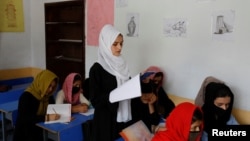From the world’s second-smallest state, Monaco, to the most populous country, India, representatives from more than 20 governments and international organizations on Monday condemned the Taliban’s policies of shutting down secondary schools and denying other fundamental rights to Afghan girls and women.
Even Pakistan, the purported benefactor of the Taliban, voiced concern at a United Nations dialogue on human rights in Afghanistan about the denial of education for Afghan girls. The dialogue was part of the U.N. Human Rights Council’s 51st session, which opened Monday in Geneva.
Russia and China notably did not join in the criticism. A Russian diplomat pointed to progress made for women’s rights under the Taliban.
“We note efforts by the new Afghan government to ensure the rights of women and girls in the areas of marriage and property inheritance,” a Russian representative told the U.N. event, adding that more than 130,000 women are employed in the health and education sectors.
No Taliban representative was present at the event because the U.N. does not recognize the Taliban’s so-called Islamic Emirate as the legitimate government of Afghanistan. Instead, diplomats of the former Afghan government are still accredited as Afghan representatives at U.N. headquarters in New York and Geneva.
The Russian diplomat further said that some schools were closed because the Taliban could not afford to set up segregated classrooms for girls. He blamed the United States and other Western donors for freezing aid to Afghanistan and imposing sanctions on the Taliban which, according to the Russian diplomat, have adversely affected the Afghan education sector.
“We call on the U.S. and the U.K. and their satellites — instead of issuing new demands to the Taliban, to begin fulfilling their own obligations for the past conflict,” he said, adding that the current crisis in Afghanistan was a result of the past two decades of U.S. intervention there.
While calling for the return of girls to secondary schools in Afghanistan, a Chinese representative also avoided criticizing the Taliban’s policy.
“We call on the countries concerned to respect sovereignty and territorial integrity of the country and to lift unilateral sanctions,” the Chinese representative said.
Monday’s statement was the strongest that any Russian official has made in support of the Taliban.
“The Russian representative’s statements in Geneva aren't consistent with what Russia has said before in other settings about Afghanistan,” John Sifton, Asia advocacy director at Human Rights Watch, told VOA.
“As recently as this June, Russia agreed to a strongly worded statement by the U.N. Security Council about Afghanistan in which the Security Council as a bloc, including Russia, called on the Taliban to let girls go to school.”
Even the Taliban have not said that Western sanctions and the resulting economic problems have forced them to shut secondary schools for girls. Taliban officials have offered religious and cultural justifications for their decision against secondary education for girls.
“We recognize that the economic crisis is impacting the humanitarian situation. We agree about that. But the idea that it's responsible for the fact that [the] Taliban do not let girls go to secondary schools is absurd. It is preposterous. It is a lie,” said Sifton.
Women 'erased'
The U.N. and human rights groups accuse the Taliban of implementing policies that are aimed at erasing women from the public spheres.
“There is no country in the world where women and girls have so rapidly been deprived of their fundamental human rights purely because of gender,” Richard Bennett, U.N. special rapporteur on Afghanistan, told the U.N. Human Rights Council's 51st session.
“Do you know what that feeling is, to be erased?” Mahbouba Seraj, an Afghan women’s rights activist, asked the same session. “I'm erased, and I don't know what else to do. … How many times am I supposed to yell and scream and say, ‘World, pay attention to us. We are dying’?”
The Taliban have defended their policies toward Afghan women while accusing the U.N. and rights activists of spreading “malicious propaganda” against their de facto government.
“Today, nothing threatens the lives of women in Afghanistan, and no woman or her loved ones die in the war or raids,” said a Taliban statement issued in response to Bennett’s report. “There are 181 public and private universities open for men and women in the country, and thousands of women work in education, higher education, public health, passport and national identification bureaus, airports, police, media, banks and other sectors.”
Such statements, however, are viewed with deep skepticism outside Taliban circles.
The Taliban have become increasingly authoritarian, clamping down on freedom of expression and denying people their civic and political rights, the U.N. has reported.
At the U.N. event, representatives from many countries called for stronger international pressure on the Taliban to respect women’s rights.
“Anyone seeking to participate in the international system must respect [women’s rights]. If we don’t all insist on that, then shame on us,” said Michèle Taylor, U.S. representative to the U.N. Human Rights Council.
In April, the U.N. General Assembly suspended Russia from the Human Rights Council because of the country’s reported atrocities in Ukraine.





